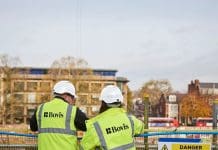Working with the University of Stirling, Space Architects has helped to create the first-of-its-kind Iridis apps to improve the design of homes for people living with dementia. Director Stephen Brooks explains their development
Earlier this year, Space Group was approached by the University of Stirling’s Dementia Services Development Centre (DSDC) to digitise its audit process of homes for those living with dementia. At Space, our forward-thinking, technology-hungry teams are at the forefront of digital construction methodology and this was the perfect project for us to support.
We are passionate that our projects result in spaces that work for the occupants, whether that means luxurious surroundings or specially adapted spaces for those living with the confusing and debilitating effects of dementia. Having already delivered on a large number of care homes throughout the UK, our level of understanding on the accommodation needs of the third and fourth age meant that we could apply these design principles to the audit process.
The audit tool already existed in a paper-based format, which was carried out by research professionals with an associated cost. However, there was a need to simplify this process so that not only those designing/refurbishing accommodation spaces could carry out an audit themselves, but individuals could also take full advantage of the service for free.
Therefore, there was a requirement to create an easy-to-use platform in an accessible format. The idea of the Iridis app was born.
The Iridis apps
The university’s decision to make available, to everyone, a service that typically carried a cost meant that an essential service to improve the lives of people with dementia would soon be far more accessible.
Iridis apps allow users to use their smartphones and tablets to assess environments, such as homes or hospitals, to ensure they comply with dementia design principles, which in turn helps to reduce confusion and risk.
The technology asks users – including people with dementia and their family members, as well as designers, architects and healthcare professionals – a series of questions about their surroundings and requests photographs of the environment. It then uses the data to highlight potential problems – such as issues with furniture, lighting, colour contrast and noise – before recommending changes that could enhance the environment.
Recommended improvements could be as simple as improving lighting to more complex enhancements, such as reconfiguring bathrooms. Typically, the assessment of a two-bedroom home would only take around 20 minutes to complete.
The apps are designed to allow people with dementia to live independently for longer and, in turn, could help ease pressure on hospitals. They will highlight further benefits to the health and care sectors, with hospital and care home environments being vital in ensuring patients receive the best possible outcomes.
A suite of apps for different uses are being developed and in September, Space Group and the DSDC launched the first two in the series: the homeowners app and a professional services app.
Living with dementia
Today there are over two million elderly people in the UK who have a care-related need, with more than half of these being unable to afford adequate personal care. But surveys show that 90% of over-50s would prefer to stay at home even when they need care.
In the UK, a wealth of housing stock is categorically unsuitable for elderly living. We are in an era where people are living longer and we have a duty of care to offer a better quality of life and improved living standards to allow people to remain independent for longer. Creating housing stock that is designed or reconfigured specifically for an aging population is therefore essential.
The DSDC is a world-leading authority dedicated to improving the lives of people with dementia and, although this service is not unique, the digital delivery method is the first of its kind.
The purpose of assessing residences is to allow people with dementia to stay independent for longer, delaying the need for professional care services. If a person with dementia can have their home adapted to accommodate their changing needs, this gives them greater freedom, flexibly and quality of life.
Digital construction
The Iridis apps will assist construction professionals by making recommendations on property design and refurb. It is digital construction-based with links to the BIM object provider, bimstore.
Recommendations are made on products/product types and those which are dementia care design approved and can be specified and selected via bimstore.
The software developed within the app is one of the greatest advances to date in dementia care design principles. Creating fully inclusive built environments is a considerable undertaking and highlights a new area under consideration for the third and fourth age. This software will offer designers and contractors new intelligence needed to facilitate and future-proof dementia care design.
Data from the apps will be used to inform further research for future planning on design and buildings of homes and housing. This data will allow us to understand the needs of the elderly in even greater detail and with greater certainty.
The apps are an industry game-changer, a catalyst for improved design and the first of their kind that bring together intelligent data and residential design processes.
Stephen Brooks
Director
Space Group
Tel: +44 (0)844-800-6660
Twitter: @WeAreSpaceGroup
Facebook: Spacegroupuk

















![[VIDEO] UK-based firm reveals ‘world’s first’ fully AI-driven architectural project Studio Tim Fu has revealed the 'world's first' fully AI-driven architectural project in Slovenia, developing six luxury villas on the Lake Bled Estate](https://www.pbctoday.co.uk/news/wp-content/uploads/2025/03/Interior-1-studio-tim-fu-218x150.gif)